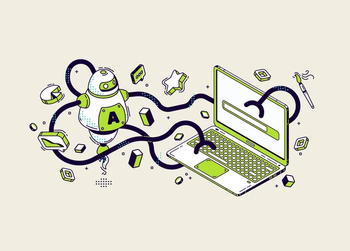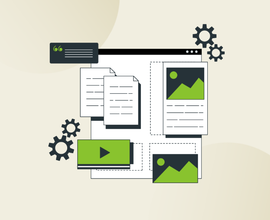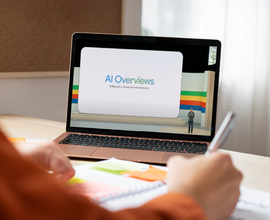The New Era of AI in the Workplace: A CTO's Perspective
- Thought Leadership
- By Alok Srivastava
- 11 minutes read
See how AI is revolutionizing the workplace from the perspective of our CTO, Alok Srivastava. Plus, get a sneak peak at our approach to AI adoption.
As a Chief Technology Officer in today's rapidly changing world, I've witnessed the transformative power of technology firsthand throughout my career. Each tech-driven innovation has reshaped how we work and do business, from computers to the internet. Artificial Intelligence (AI)—specifically, generative AI—has taken this transformation to a new level, especially within the SEO industry where Conductor operates. The race is already on from leading brands , including Instacart, Microsoft, Slack, and Duolingo, to find the best ways to integrate AI into workflows to maximize efficiency, fuel growth, and conserve spend.
But before you start evaluating which solutions to adopt (for SEO or otherwise), I believe it's essential to understand the ways AI could influence productivity, efficiency, personalization, top-line revenue, and more in the workplace to help inform your AI strategy and generate the most positive impact for your organization.
The top business benefits and role-specific use cases of AI in the workplace
AI is a game-changer that democratizes technology and improves productivity by automating workflows, enabling new content creation possibilities, doing deep analyses of complex data sets, and more. It’s incredible to consider what this technology will make possible, some of which we are only beginning to scratch the surface of.
I’d like to share some of the ways I’ve seen AI revolutionizing different departments and business processes in the hopes that it sparks some new ideas of how to transform roles within your organization.
1. Increased productivity and efficiency
The potential of AI to revolutionize productivity and efficiency in enterprise businesses is mind-boggling. Think about it: with AI-powered tools and systems, we can automate repetitive tasks, streamline decision-making processes, and unlock valuable insights from mountains of data.
3 Role-specific use cases on how to boost productivity and efficiency with AI:
- Software Engineering: AI can significantly accelerate agile development processes through automation, e.g., auto-generating code snippets and test cases to reduce manual effort and provide broader test coverage, task assignment automation, backlog prioritization and resource allocation to facilitate faster development cycles and improved team collaboration, and analyzing code changes, identifying potential issues, and automating the deployment process to enable faster and more frequent releases.
- Customer Support: AI can analyze usage patterns to generate personalized recommendations, automate support ticket routing, and offer self-service options through chatbots. Customer-focused teams can benefit from AI-powered onboarding platforms that provide interactive, step-by-step guidance for users, reducing manual assistance and freeing up customer success managers to focus on strategic initiatives.
- Marketing: AI-powered automation platforms can streamline repetitive tasks related to email marketing, lead nurturing, content creation, and campaign management, like prioritizing leads for conversion. This automation increases productivity, enabling marketers to invest more time in A/B testing, audience and market research, and more.
2. Better decision making
AI's ability to analyze large amounts of data makes it possible to identify patterns and trends that would be difficult for humans—enabling businesses to make better decisions on everything from product development to marketing campaigns.
3 Role-specific use cases on how AI improves decision-making:
- Sales: AI can analyze intent signals and engagement metrics at scale to identify which prospects to prioritize. Sales teams can use AI to analyze historical sales data, identify patterns, and optimize sales processes.
- HR: AI can help predict the likelihood of employee attrition by analyzing historical employee data and external factors, allowing HR teams to implement retention strategies and address potential issues in advance. AI-enabled tools can also help eliminate unconscious bias in the hiring process by anonymizing candidate information.
- Finance: Finance teams can use AI-enabled forecasting and planning tools to generate accurate financial forecasts, empowering organizations to plan and allocate resources effectively.
3. Reduced costs
By embracing AI, you can unlock a world of savings and efficiency, driving your enterprise business towards more sustainable success. With AI to monitor and automatically scale investment, you can maximize your ROI by freeing up valuable time and resources.
3 Role-specific use cases on how AI optimizes business costs:
- Software Engineering: AI-assisted infrastructure management can analyze resource utilization patterns and provide recommendations or automations to adjust capacity based on demand. This reduces unnecessary expenses and improves cost efficiency.
- Marketing: Marketing can use AI to automate the process of ad placement and targeting, optimizing ad spend and improving campaign efficiency. AI can also analyze historical campaign performance and market data to recommend optimal budget allocation across different marketing channels, ensuring cost-effective marketing strategies.
- Finance: AI-powered expense management platforms can automate expense reporting, analyze spending patterns, and recommend cost-saving measures. The tech can analyze vendor data, track performance metrics, and negotiate contracts to optimize vendor relationships and costs.
4. Learning and development prioritization
The impact on employment is a significant concern with AI. In the new era of AI, workers will need to unlearn old ways, learn new skills quickly, and work effectively with AI-powered tools. The World Economic Forum predicts that 60% of workers will need retraining by 2027 , according to The Future of Jobs Report 2023.
Even though AI is causing this widespread challenge, I think it could be the solution. AI-powered learning methods will make accessing knowledge bases and finding specific information from the best sources easier for workers prioritizing skills development while managing a 40-hour work week.
3 Role-specific use cases on how AI can help address learning and development needs:
- Software Engineering: AI-powered tools can help engineers and developers by searching and understanding code repositories, facilitating learning, and distributing knowledge within the organization. Learning platforms can leverage machine learning to recommend personalized courses and resources tailored to individual employees’ skill levels and interests.
- Sales: Sales coaching and training platforms can leverage AI to analyze sales calls and provide feedback and coaching recommendations to help sales representatives enhance their skills and performance. Other platforms deliver personalized training content and modules to sales teams, adapting to individual learning styles and preferences.
- Customer Support: AI-based learning platforms can provide personalized training programs to customers based on their specific needs and usage patterns. This enables self-paced learning and ongoing skill development to help them maximize the product or service while freeing up your customer support team.
5. Increased employee engagement and motivation
AI becomes an invaluable teammate—rather than a replacement—when it takes on mundane and repetitive tasks, liberating our employees to focus on more meaningful and impactful work. By automating these routine tasks, AI saves time and empowers our workforce to unleash their full potential. AI can act as a personal assistant, offering intelligent suggestions, insights, and personalized recommendations, igniting creativity and fostering a sense of ownership among your workforce.
3 Role-specific use cases on how AI helps boost employee motivation and engagement:
- Software Engineering: AI can analyze employees’ skills, preferences, and performance data to assign tasks that align with their expertise and interests, enhancing motivation and job satisfaction. AI-powered gamification platforms can create coding challenges, competitions, and leaderboards, fostering a sense of achievement and motivation among developers.
- Sales: AI can analyze sales performance data and provide real-time recognition and rewards to high-performing individuals or teams, boosting motivation and morale.
- Customer Support: By analyzing customer success metrics and historical data, AI can help set realistic and achievable goals for customer success, ensuring alignment and motivating them to drive positive outcomes.
6. Personalization at scale
AI's remarkable ability to analyze vast amounts of data in real-time allows us to truly understand each user’s preferences, behaviors, and needs. With this knowledge, we can deliver hyper-personalized experiences at an unimaginable scale, enabling us to forge lasting connections with customers, foster brand loyalty, and achieve remarkable customer satisfaction.
3 Role-specific use cases on how AI helps deliver personalization at scale:
- Sales: AI algorithms can analyze market conditions, customer profiles, and historical sales data to optimize pricing strategies in real-time, helping personalize discounts and maximize conversion rates and revenue. AI tools can also analyze online user behavior, identify potential customers with purchase intent, and enable the delivery of personalized offers at the right time.
- Customer Support: AI-driven sentiment analysis can synthesize customer feedback across various channels, enabling customer-focused teams to proactively address issues and provide personalized support. Knowledge Bases can be optimized with AI by analyzing customer queries and support ticket data to identify the most valuable content.
- Marketing: AI can also analyze customer behavior, preferences, and historical data to predict future actions and behaviors, enabling marketers to anticipate customer needs and deliver tailored marketing campaigns. AI provides our first real opportunity to produce one-to-one personalized content at scale.
Make the most of the benefits of AI by identifying the core needs of each department and weighing these against the main priorities for the business. This can help you evaluate which benefits will produce the most significant impact aligned with your goals.
The top challenges and considerations of AI in the workplace
As exciting as this time of significant AI innovation is, I am acutely aware of the ethical considerations and challenges associated with implementing AI in the workplace. The recent generative AI developments have opened up new business opportunities to enhance operations and drive growth. But it’s crucial to approach AI implementation cautiously and address the ethical considerations and challenges that come with it.
Below are a few aspects that I believe businesses need to be mindful of when embracing AI.
Addressing AI bias and ensuring fairness
One significant challenge in AI lies in the potential of algorithms to inadvertently perpetuate biases and result in unfair treatment of employees or customers. It is essential to mitigate bias in AI systems by implementing diverse and inclusive teams and regularly reviewing and auditing AI algorithms.
Safeguarding privacy and data security
AI systems rely on extensive data collection and analysis, including sensitive information about individuals and businesses. Implementing robust data protection measures, adhering to privacy regulations, and fostering a culture of data security are crucial for maintaining trust and safeguarding the privacy of our workforce and customers.
Protecting job security
While it's true that specific roles may be affected by the automation capabilities of AI, it's essential to recognize that technological advancements have historically generated new job opportunities. Leadership should embrace the changing landscape and focus on upskilling and reskilling their workforce to adapt to new roles and responsibilities created by AI technologies.
Overcoming resistance to AI adoption
Despite the numerous advantages of AI, there can still be resistance to its adoption within workplaces. To address this, organizations must prioritize AI education and training initiatives, promote transparency in AI systems, and encourage open dialogue about the benefits and challenges of AI in the workplace.
Embracing AI with purpose at Conductor
With innovation in data architectures for accessibility, scalability, and governance, AI models are becoming more affordable, smarter, and usable every day. While predicting the full impact of AI is impossible, what we can be sure of is the need to embrace AI ethically and responsibly—both culturally within the workplace and within the products we build.
Culturally, we’ve encouraged our employees to embrace an AI-driven mindset with training, dedicated Slack channels, and Hackathon competitions to keep them updated, informed, and engaged as we continue our AI journey. Our AI-powered Operations Hackathon, in particular, aims to empower our talented workforce to discover ways to enhance efficiency and effectiveness in their day-to-day business processes and workflows. We believe that by motivating our employees to engage with AI actively, we can drive innovation, achieve remarkable results, and fully harness the potential of AI within the workplace.
From a product standpoint, we are focused on building a holistic data foundation rather than racing to churn out the type of short-term, commoditized AI-tools currently flooding the market. At Conductor, we are pursuing a deeply considered AI strategy and playbook to accelerate value creation and productivity for our customers. Our SaaS platform is powered by data at scale, and it’s what powers the quality and impact of any AI-driven insight within the product.
We want to harness the state of the art in AI within our product and across our business operations. But we want to do it responsibly with meaning, transparency, and sound methodology in our implementation. At Conductor, we have made centering around “One Holistic Platform” as one of our company-wide objectives and have also developed an “AI Policy” to establish the guidelines and standards for responsible sourcing and use of AI technologies to conduct company business.
For our valued customers or those following along Conductor’s journey, I’m excited to move towards the future together in embracing AI ethically and responsibly, with the deliberate purpose of building business value while nurturing a culture that puts people and customers first.
Small sections of this blog’s initial draft were composed with the help of generative AI; primarily the role-based use case examples. We hope you found it helpful!







